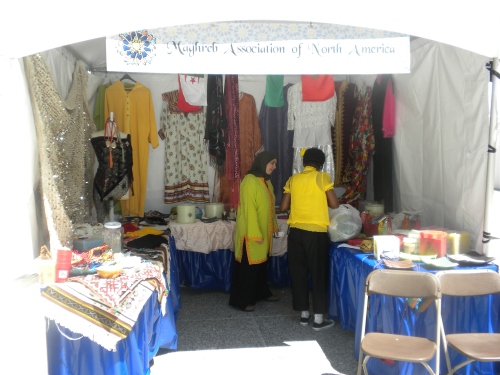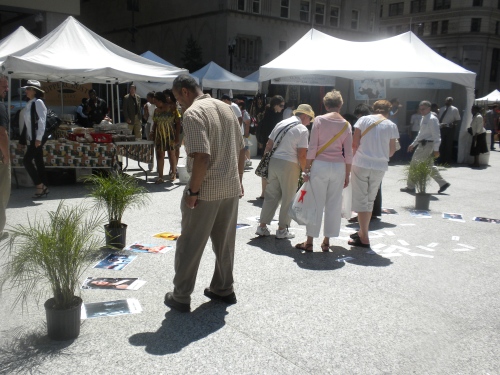Let me start by saying that I didn’t start to study Arabic to get into politics.
Which is part of the reason why Neil MacFarquhar‘s crash course in Middle Eastern politics was so illuminating. The book is organized by themes: “Satellite TV,” “Talking about Jihad,” “Police States,” etc., and spans “from Tehran to Marrakesh,” as he puts it. MacFarquhar draws on years of experience as a New York Times correspondent based in Cairo, and tons of interviews of local influential people he collected over the course of a year or so.

MacFarquhar’s childhood in Libya
MacFarquhar starts off his book by painting a picture of his childhood, spent in an oil company community in Libya. Above all MacFarquhar stresses that he and his family, Americans who lived in a gated community surrounded by other expats, were by no means immersed in Libyan society. At the same time he lays claim to a kind of relationship with the region that comes from childhood experiences—he’s nostalgic for the sounds and smells of the souq, for instance. I was drawn in by this chapter-long disclaimer, and took it as an indication of his self-awareness and implied understanding of the complexities of the Middle East. Though he’s self-conscious about his sheltered upbringing, he doesn’t write off his experience as illegitimate—and neither do I. His is one of the many facets of life in an Arab and Middle Eastern country.
Don’t file this under “Travel Books”
To call this a travel book (as it’s being marketed) is misleading. In fact for the most part, MacFarquhar stays far away from the kind of exotic and romantic “Arabian Nights” business which usually keeps me away from any New York Times travel section article about Morocco. (See also: Sex and the City 2 trailer; Jessica Simpson’s cringe-worthy exposé on Moroccan standards of beauty.)
Where can the U.S. fit into the picture?
MacFarquhar has an agenda, for sure. The underlying theme of this book on the “Changing Middle East” is one of…“hope.” For reference, the book was published in 2009, when the “hope” trope was already beyond clichéd and moving into “tacky” territory. The last chapter, which is heavy on the H word, is redeemed somewhat when MacFarquhar offers concrete thoughts for the U.S. State Department’s proverbial suggestion box. Here are his three “conclusions about the way the U.S. could be really effective in bring about change [in the Middle East]:”
1) Address basic quality of life concerns of people, such as education—but on their terms.
2) Be more vocal in supporting grassroots change—but not directly.
3) Be more consistent in condemning repression of all kinds, but especially the secret police—even among our allies.
An underlying theme in his description of U.S. involvement in the Middle East is our country’s misunderstanding of local cultures, and the presumption that we can manipulate the political or cultural scene to our advantage without having our efforts backfire. In the chapter on satellite TV, for instance, MacFarquhar talks about the US-sponsored network Al-Hurra, which provided viewers with programming that the State Department deemed appropriate, but not with any programming that anyone actually wanted to watch. Here are his words:
“Al-Hurra’s main problem was that instead of becoming an independent news source, its choice of programs was clouded by disputes between American critics, particularly conservative critics, over what they thought Arabs should be watching. They had the paternalistic attitude that the station should be like castor oil: good for the viewers rather than what people in the region actually wanted to watch…As the Arab state broadcasts show, politicians make lousy editors.”
I love that castor oil image, because for me it evokes not only paternalism but also quackery.
One major mind-bender here is the question of the Americans’ role in other societies. On the one hand to say that we are powerless to ease suffering and repression in the world is disingenuous. On the other hand, it is counter-productive to meddle to the point where Americans are perceived as paternalistic and self-interested (if not evil and undermining of local values). Somewhere in civil society and local arts, science, and intellectual communities (in various levels of underground status) we should, “somehow,” be able to “find a way” to nudge along locally grown movements that could be beneficial to Middle Eastern countries and to longer term peace and stability in the region. In other words, trying to transplant American values directly into another country is no better than having higher ups dictate to citizens what they can and can’t watch, read, or wear. Our challenge is to find a way to “do no harm” as we seek a way to encourage justice and more open society.
Americans are not from Mars, and the Middle East is not, in fact, located on Venus.
This book, a must-read for anyone who feels like understanding “the Middle East” is beyond their grasp, left me feeling more than ever that I still know very little. I’m not sure that I feel as optimistic as MacFarquhar in his last chapter, which in any case comes off as a little forced. However his book reaffirms my belief in the importance of cross-cultural learning. Do we, or our own leaders for that matter, have an understanding of the Middle East that goes beyond finding ways to exert American influence, diplomatic or otherwise? Take for instance the war in Iraq. Leaving aside the fact that “spreading Democracy” served as a pretext for aggression (my opinion), isn’t it preposterous to think that we can decide what’s best for a culture that the vast majority of us aren’t the least bit familiar with?
I won’t spend a paragraph here to endorse or defend President Obama, but I will say this: My interest in him as a candidate came in large part from his (presumed) international perspective, transmitted not only through his Kenyan father and anthropologist mother, but also through his experience living as a child in Indonesia. It’s disturbing to me that so many people revile him for that very reason. Of course it’s easier to throw up our hands in frustration at not understanding those non (and un-) Americans, and to write off millions of people as “crazy,” “extremist,” “haters of freedom.” Never mind that our country has already played an important role in shaping the region we fear so much.
It’s not a simple task to try to understand foreign cultures, but it’s an important one.









